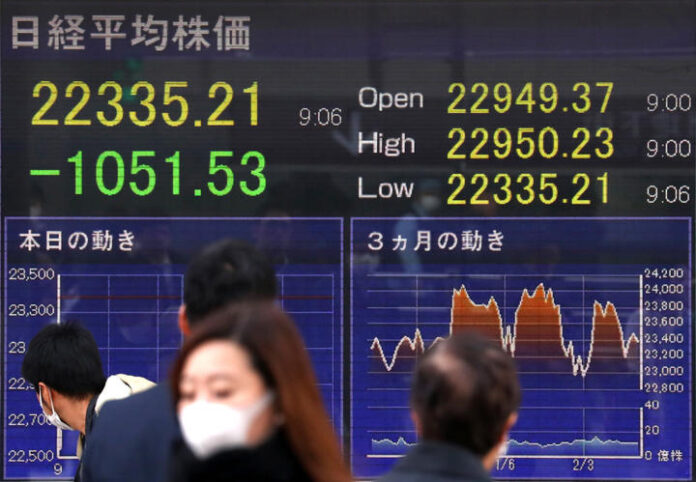Japanese and Australian stocks tumbled Friday at the end of a healthy week across world markets, with traders tracking a sell-off on Wall Street as another huge jump in jobless claims underlined the impact of coronavirus on the global economy.
Tokyo’s Nikkei 225 ended the morning down 2.29 percent, or 463.28 points, at 19,730.41, while the broader Topix index slipped 2.00 percent, or 29.23 points, to 1,434.80. “Sell-orders are seen dominating early trade in the Japanese stocks market following falls in US shares,” Okasan Online Securities said.
Sydney fell nearly four percent and Wellington dropped 0.6 percent, with the rest of Asia closed for public holidays. US markets turned negative after the Labor Department said another 3.8 million US workers filed for unemployment benefits last week, taking the six-week total above 30 million.
That came as data showed the eurozone economy shrunk 3.5 percent in the first quarter, following a slightly worse performance in the US with expectations that deeper contractions will come in the next three months. Investors have also been spooked by comments from Donald Trump indicating he could hit China with further tariffs over its handling of the virus crisis, saying he had seen evidence linking a Wuhan lab to the contagion. The sell-off comes at the end of a bright week for equities fuelled by signs that coronavirus infections and deaths are easing around the world while governments begin easing lockdown restrictions that have strangled their economies.
Oil prices rose, however — with WTI up four percent to add to two days of 25-percent gains — as massive output cuts began to kick in, while Norway and crude major ConocoPhillips said they would join in turning the taps lower. Brent rose two percent. The risk-off mood also weighed on higher-yielding, riskier currencies, with South Korea’s won and the Australian dollar losing more than one percent, while Mexico’s peso and the South African rand dropped around three percent.
Traders in Tokyo were also watching for news on North Korean leader Kim Jong Un’s health, and reports that the Japanese government will extend a nationwide state of emergency over the coronavirus, Okasan senior strategist Rikiya Takebe said. Some investors were also trading to adjust their positions ahead of the so-called Golden Week holiday through Wednesday, analysts said. The dollar fetched 107.35 yen in early Asian trade, against 107.23 yen in New York late Thursday.




